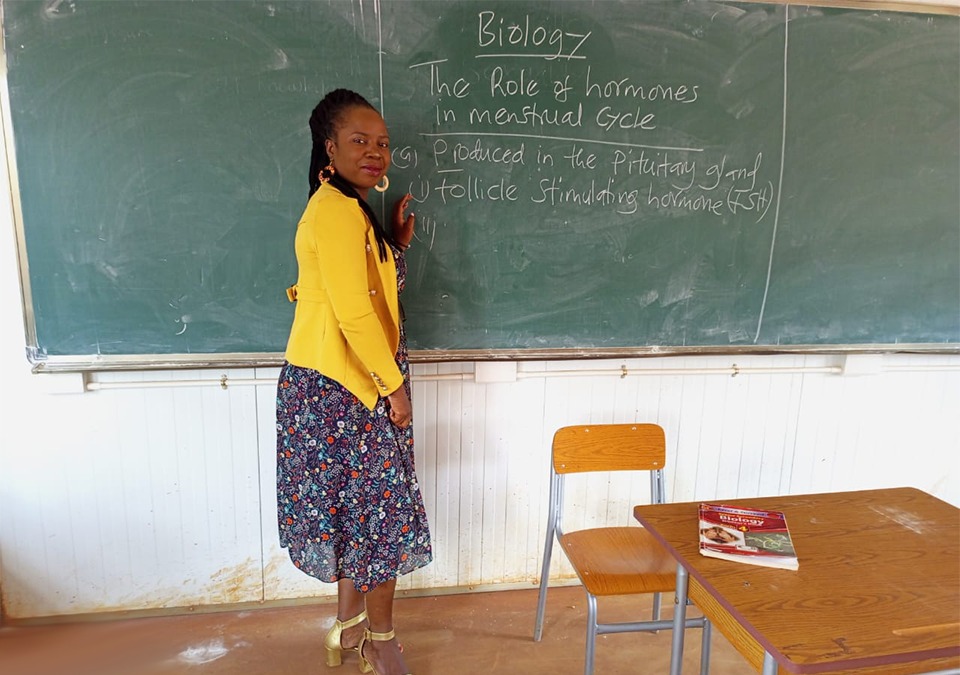|
Getting your Trinity Audio player ready...
|
By UNESCO Regional Office for Southern Africa
“In Malawi, education is the only escape valve for girls and women out of poverty and abuse”, says Wezzie Kacheche, a secondary school teacher from the northern region of Malawi. “Learning about health and well-being helps young people gain a bargaining power on their needs and rights.”
In Malawi, over half of the women who have never been to school became pregnant in their adolescence, compared to 19% of those with secondary education according to country data. Early marriage of both girls and boys in the country is also the fourth highest among East and Southern African countries. This shows how powerful a focus on health education can be to improve education pathways, end an early marriage and unintended pregnancy and contribute to closing the poverty cycle.
Meet Wezzie, an inspiring life skills teacher
Wezzie teaches biology and life skills at Lupaso community secondary school. Life skills education, also called comprehensive sexuality education (CSE) in other countries, is her favourite subject and one she has been teaching for 18 years. “At a time where young people get most of their information online or among peers, CSE helps them get appropriate information about health and sexuality, and demystify adolescence”, says Wezzie.
Increasingly, learners in Wezzie’s school drop out due to early and unintended pregnancy, early marriage, and drug and substance abuse. Learning about health and well-being is vital for her students. “About 20% of learners come from child-headed families, 40% stay with single parents, and 30% with grandparents or other relatives. The majority of learners lack basic skills for survival, and some only afford a meal per day”, says Wezzie.
She also knows how important CSE can be for youth because of her personal story. Wezzie became pregnant as a young woman. She attributes this to her lack of knowledge of sexual and reproductive health services.
“The hardships, stress, and burdens I encountered during and after pregnancy were unbearable”, she recalls. “I started sharing my experience with girls in youth clubs. Since then, my mission has been to support young people to understand their sexuality and make healthy choices to live a happy life.”
Empowering youth to learn and thrive
Wezzie’s commitment to health education has made a real difference to her students. “One of the girls in my class was on the verge of dropping out of school due to her risky sexual activity and drinking habits. Upon watching a video about sexually transmitted infections during my class, she came to me to seek more information privately.”
Wezzie supported her through one-to-one counselling and offered information. “She’s now a changed person and her performance at school is promising, because she is focusing on her education”, says Wezzie. “Her change of trajectory is now inspiring other students to follow a healthier path.”
Wezzie benefited from UNESCO training on CSE content and teaching methodology: “Today I can happily say I am a competent and well-prepared teacher in CSE. Life skills education is now one of the most opted subjects by learners.”
Advocating for education for health and wellbeing
Teaching life skills or CSE is not easy. “For a long time, our culture had been silent on sexuality and when I joined the teaching service in 2004, teachers were concerned about CSE”, she says. “Those of us who taught the subject were badly perceived. However, we received training and support from organizations like UNESCO, gained more skills, stood our ground, and continued to teach the subject with zeal and confidence.”
Optimist, Wezzie has great hope for the future of her students. She continues to prevent dropouts, early pregnancy and early marriage at her school through her health-focus teaching practice. Wezzie also recognizes the importance of psychosocial support and youth health service to learners.
One of her dreams is “for all learners to access quality CSE” in Malawi and around the world. “It helps students make healthy choices about their health and well-being and focus on their education – key to their socioeconomic empowerment and helps them live a happy life.”
Education for health and well-being delivered in school is making a difference in the education and the life of many young people. While nearly all countries recognize the importance of health and nutrition in schools, in practice the reality is not responding to those who need it the most and there are large discrepancies. As a joint effort, UNESCO together with UNICEF, WFP and other partners have released a new global report entitled ‘Ready to learn and thrive’ on school health and nutrition around the world.
More information:






